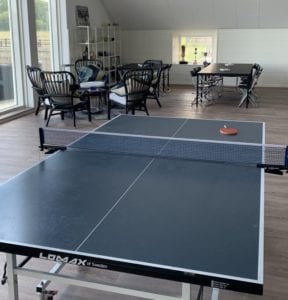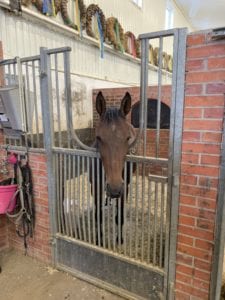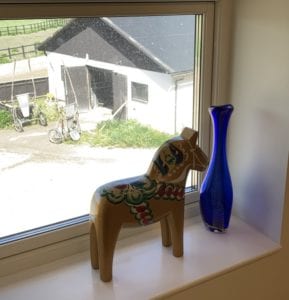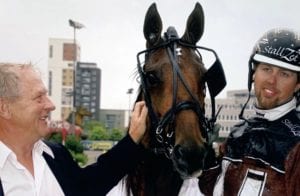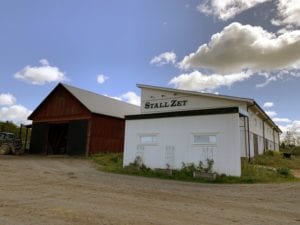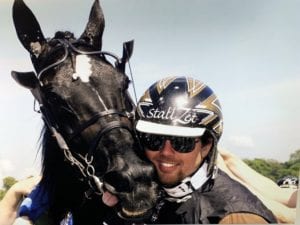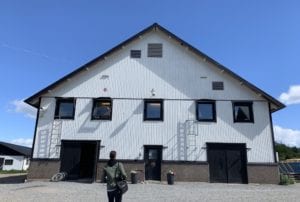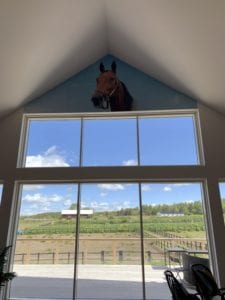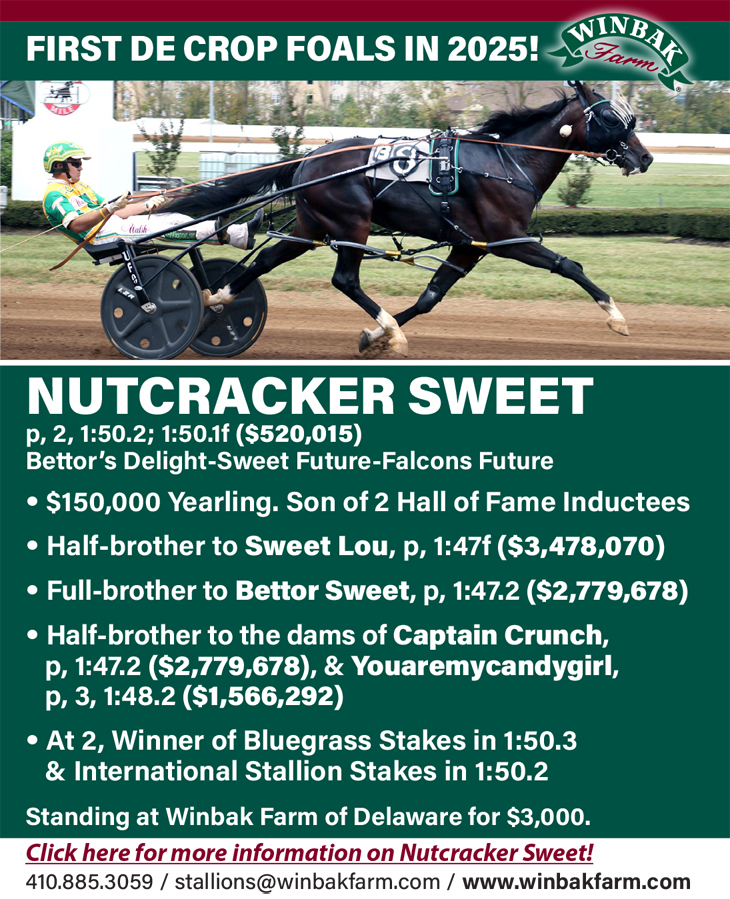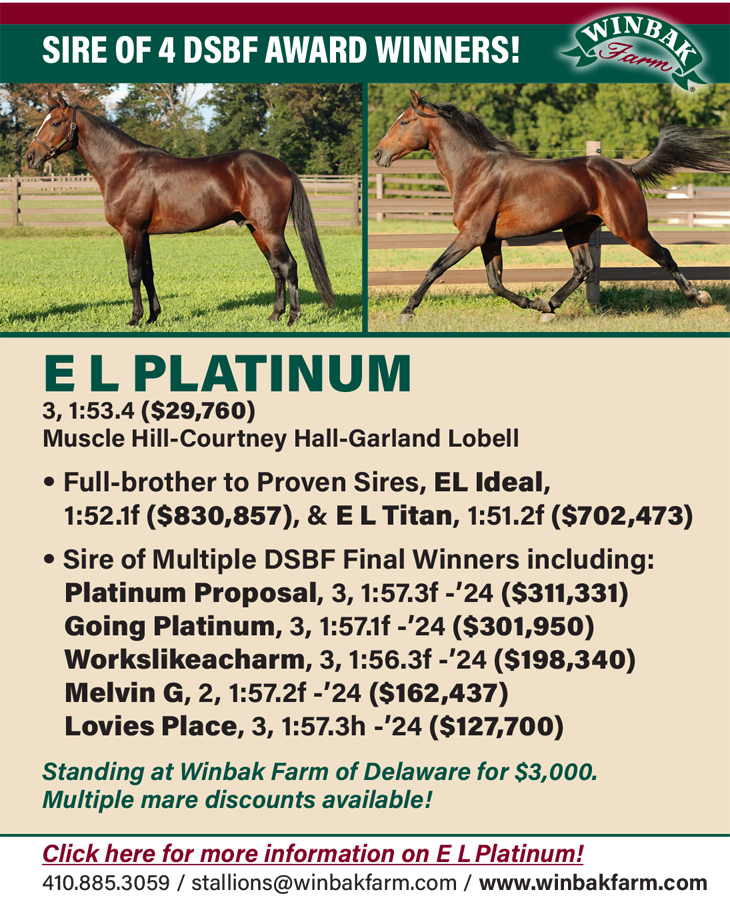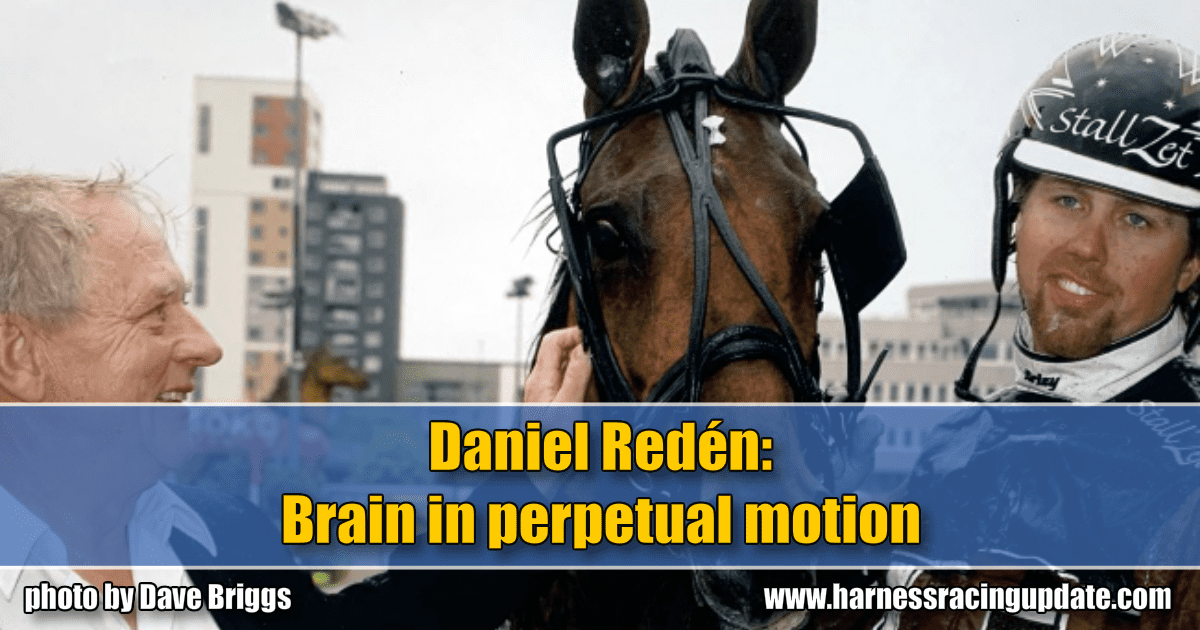
Brain in perpetual motion
Rising star Daniel Redén has ditched his stopwatch and jogging routine, tried deep straight tracks, short bursts of training, maximum paddock time and even spiritual mediums to help him get the most out of his horses. Though the Swedish trainer has yet to win his coveted Elitloppet despite multiple cracks at his country’s top trotting prize, he is not, for one second, about to give up.
story and photos by Dave Briggs
Daniel Redén has one of those faces that suggest his brain is always spinning, chugging, processing the next move. It was exactly the expression the 39-year-old Swedish trainer was wearing three days after failing to win his beloved Elitloppet despite having a record four entrants, including one of the favorites, Propulsion (who finished third).
Sitting at his farm office computer, over-sized headphones clamped just off his ears to the side of his active noggin, fingers in pondering formation on his face, Redén said he thinks he has figured out why Propulsion, Double Exposure, Sorbet and Heavy Sound all were unusually sluggish on Elitlopp Sunday, whereas Missile Hill, his new acquisition from the United States, was gangbusters winning the $105,000 Fyraåringseliten for 4-year-olds that same afternoon at Solvalla.
Unlike 2018, when Sweden experienced a drought and high temperatures, this year the weather was overly rainy and temperate, making for overly-lush paddocks. Redén, who obsesses about trying to let horses be horses to bring out both their best possible performance and a predictable level of consistency, turned out his Elitlopp horses to enjoy the fresh, beautiful grass. He figures the quartet filled up on grass rather than feed. Meanwhile, Missile Hill was turned out separately in a paddock without much grass and heartily ate what he was given.
“This year I learned a lot and I think I know why my horses didn’t perform the way I wanted them to,” Redén said, contemplating the ceiling for a second and sighing. “This year there was much rain before the Elitlopp. The grass just started growing and they went in this big field so they could eat and get strong. I think that’s why my horses were very lazy and not the best.
“If I could do it again this year, the last four days they would not be in the paddock. I would have been out there walking with them and maybe I’d put them in the small (paddock) without the grass. Missile Hill was in one of those paddocks without grass and he was happy.”
Redén said he can’t sleep until he figures out why his horses don’t perform well. That said, he laughed when asked if finding an answer as to why his Elitlopp horses weren’t at their best at least allowed him to rest easier.
“No, I just find another thing to not sleep about. I’m trying to find the answer to black holes, too,” he said, laughing. “It’s not so easy. My mind is always spinning.”
Longtime friend, righthand man and HRU columnist Thomas Hedlund nods in agreement about how Redén’s mind works.
“This is true, this energy talk and this (fixation with) black holes,” Hedlund said. “Last night, he called me and he had figured out something…”
“I’m into this time equation, what is time?” Redén said, adding that he thinks it is possible to move backwards and forwards in time.
“It’s hard for me to explain in English.”
For now, he just wishes he could jump back in time a week or two before the Elitlopp, which he has never won.
“Then I know that Propulsion would win with 30 metres left to race, because he’s so much better than the horses (that) raced on Sunday, normally,” Redén said. “Readly Express and him are similar. The other horses, they are not there.”
But more on black holes and the spiritual energy of horse-reading mediums in a second.
RISING STAR
Redén, who trains mostly for Bengt Ågerup’s Brixton Medical AB, is one of the trotting world’s rising stars. He is a quiet man of deep contemplation, forever tinkering with what doesn’t work and what does — never satisfied. He is somewhat shy and avoids the limelight.
The goal, the trainer explained, using his hands for emphasis, is to avoid great hills and valleys in his horses’ performances and produce a flat line of incredible consistency. To accomplish that, he wants horses to be happy and strong and eager to perform at their best.
“If you see my result, all of the time the horses are performing at a high level. Not the highest, but we are there,” he said.
Both Redén and Hedlund met while working for top Swedish trainer Stefan Melander and both left in 2009. Redén went to work as the private trainer for Stall Zet (the stable name of Brixton Medical AB). Hedlund, a racing journalist who dreamed as a child of being a driver, joined Redén not long after as the office manager / bookkeeper.
A decade later, Redén is training 85 horses, 74 of them for Brixton Medical AB.
Between 2015 and 2019 (so far), Redén’s trainees have won 461 races, posted a collective win percentage of 22 per cent and earned $12.73 million combined (U.S. dollars). His best year was 2018 when he had a record of 122-96-60 in 502 starts, good for a win percentage of 24 per cent and personal best of more than $4.6 million. This year Redén is winning at a rate of 32 per cent.
In 2013, Redén made a radical change in his approach to training. At the time, he was jogging or training his horses every day. Then his horses started to get sick.
“I thought, ‘I must be doing something wrong. I must be stressing them or something,’” Redén said.
About that time, he read a scientific article that found the benefits of humans riding a test bike as hard as they could peddle for one minute every day at the same time for a month were as good, if not better, than those of someone who jogged six miles a day.
Redén thought horses might benefit from the same short, but incredibly intense training, doing so on a heavy straight track and just two times a week. The rest of the time, the horses would be turned out in paddocks to allow them to be horses.
He went on a search for the right material. Sand was good, but he knew horses that trained regularly on beaches were prone to tendon injuries. He decided a mix of sand and clay would be best.
“Every horse was sick, so I had to try. I went all over trying to find the new materials and bought a tractor to work the new tracks. People were thinking, ‘He’s totally lost it now,’” Redén said, laughing.
The positive results came quickly, as did the finger-pointing.
“It was hard, because I was not so famous. I was new in this situation, so there was so much s— and people sending emails. They were really crazy,” Redén said.
Most of his accusers were gamblers, but even a famous Swedish horse racing journalist implied, in the country’s biggest newspaper, that Redén was cheating.
“I was angry I stopped talking to him and said I was angry. He called me up and I tried to explain to him (the changes I had made),” Redén said. “Then everything changed because he called his source who had said he was 100 per cent certain that I cheated. He called him up again after he talked to me and asked where he got his information and the source said, ‘I was making it up.’”
Today, that journalist is a regular visitor to Redén’s farm.
“He’s here all the time now and he sees how I train. It’s great to understand and see it with his own eyes,” Redén said, adding his farm is always open. “If you look at my horses at the track, no one has horses that look like mine… I want them to be like that. Our distance racing is no real distance for a horse, so I have them like 100, 200-metre runners, like human (sprinters)… I want them to have big muscles and (the deep, heavy straight track) is one way to do it.”
Redén’s impressive level of success in a relatively short time is all documented in the expansive and pristine complex on the second floor of his main barn at the 740-acre farm named Furuby Gård. The farm is owned by the Ågerup family and located in Örsundsbro, Sweden, about 50 miles north of Stockholm. Here you will find a plethora of well-framed racing photos that line the walls that contain an office, kitchen, some small apartments and a large lounge with a deck overlooking the farm. Apart from providing an outstanding vista, the high-ceilinged lounge comes complete with a ping-pong table, deep massage chair, large leather couch and equally-large television and lots of racing trinkets. It’s all overseen by the patron saint of Furuby Gård, as depicted in a huge mural of beloved mare Delicious that looks down on it all from the apex of the roof on the wall leading out to the deck.
DELICIOUS CHANGED EVERYTHING
Redén said he has difficulty explaining in English what Delicious means to him and his entire operation, but he doesn’t have to put it into words. It’s clear on his face that the tiny mare has secured a major piece of his heart.
The U.S.-bred Cantab Hall mare out of Ipsara LB, formerly trained by Ron Gurfein, enchanted fans in Europe many times during the summer of 2015 when she broke world records in three consecutive starts at three different distances on five-eighths mile tracks.’
“She is the most valuable horse that I’ve had contact with in my life. Everything about her is so special and she’s a fragile individual that has to be handled with care,” Redén told Hedlund for HRU back in 2017 when Delicious was retired from racing.
Redén bought Delicious at the Standardbred Horse Sales Company’s mixed auction in 2012.
“She was so small and so tiny, but she had won the last start in Lexington in a good time. She won in :52.2 (beating Maven),” Redén said. “She had a good look. The conformation was really good, but she was too small, but something hooked me about her. I talked to my owner and said, ‘I like this horse. Can we go?’ The pedigree was not (super) good and she was small. But she was fast. He said, ‘We can go to $100,000.’ I was happy, because I thought, ‘Now I will get this one and I’m happy with that.’ They started to bid and I saw straight on the other side, there was Ron Burke bidding. I thought ‘S—’. He got to $98,000, I think, and I thought this was my last try, so I said, $100,000’ and he was, like, ‘Nope’. So he has his limit, too, I guess. We were probably both at $100,000.”
When Redén got Delicious to Sweden and started training her, she started developing small colic-like symptoms, yet she began racing as advertised. Delicious won a small race against the boys and was so impressive Redén opted to try her in a 4-year-old elite race for mares on the Elitlopp card.
“She flew. She was so fast and it was raining like hell and she was the fastest horse of the day, almost,” Redén said. “It felt really, really good, because I felt something with her. She was really different than my other horses. We have a connection.
“After that race, she started to get really sick sometimes and this veterinary clinic wanted to open her and do tests and it was a different story.”
It was around this time in 2013 that Redén was desperately searching for answers for the rampant sickness that had swept his stable. No possible solution was ruled out, including hiring a spiritual medium. For a man who reads up on black holes and is intellectually curious, the medium wasn’t that much of a stretch.
“There were many, many horses that were very, very sick and had strange diseases the year before, so we had to solve this. I tried everything I knew. They were here to take tests and couldn’t find anything. The vets said the horses are not sick, but then they would take their temperatures and it would be 39 and they would say, ‘They are sick.’ They would take blood samples and they are not sick, but they were sick,” he said, explaining his decision to go the spiritual route, initially “just for fun.”
“There are no signs on the (stalls) in the stable, so he could not know which horse were\] where… but he talked first about my family, because he didn’t know he was coming to a horse place. He said something about my family that was true – my grandfather, ex-girlfriend, people that had died. He picked them out and he got many right. He asked, ‘Can we go out in the stable and look?’ I said, ‘Okay.’ So we went into the barn and he was talking a lot. Then he just stood in front of Delicious. He just stayed with her for a couple of minutes, saying nothing, just stood there. Then we just walked away and he said, ‘Daniel, this is a really, really special horse. You’re going to have some really, really great moments with this horse.’ It was just so unbelievable that he picked her out because she was so small and didn’t look like a good racehorse or anything and it was so early after she arrived.”
One year later, Delicious had a serious bout with a colic-like illness and the vets insisted they operate to save her life. Redén said he heard the words of the medium in his head about how special the mare was and refused to let the vets operate.
“I said, ‘No. If I do this, her career is done.’ (The medium) told me so many things and everything he told me was true. So, I said, ‘No, you cannot open her.’”
The vets pleaded with him, but Redén drove to the clinic and took Delicious home.
“They were so angry with me, ‘You are going to kill this little horse!’ and blah, blah, blah. I called my other vet and said, ‘I think she’s got some other problem, she’s a little stressed and we’ll give her other medicine.’ We did it my way and she started getting better and better.”
The next year, Delicious finished third in the Elitlopp.
The following year, Delicious set the three world records in a row.
But in 2017, Delicious nearly died again, this time due to a twisted bowel. Redén let the vets operate.
“She was in so much pain and one of the vets said, ‘We must open her up now.’ I saw how bad she was and I couldn’t be in the room, I had to get out because I was crying and I couldn’t see her. It was so bad. I told him ‘Yeah, yeah, open her up now.’”
Vets told Redén that if they would have waited five more minutes, Delicious would have been dead.
“They fixed her and we put her on heavy cortisone for her sickness and she’s been feeling very good. Since then, she has not been having any problems.
Nervous about her carrying her own foal, they tried breeding Delicious via embryo transfer, but it didn’t catch. A year ago, they took a chance and bred her to Daley Lovin.
“She’s happy, she looks great and she’s the Queen of the farm,” Hedlund said.
As to why Delicious means so much, Redén said she “gave me so much and earned me so much,” but, more than that, she taught him to listen to his horses.
“I don’t drive with my watch any more, I listen with my head. I think that is better and you must listen to the horses and she taught that to me… I think my skills are better,” Redén said.
As thanks, Redén even named his daughter after the mare. Jacqueline’s middle name is Delicious.
“She’s four now. Jacqueline was born just a couple of days after (Delicious’) first world record race,” Redén said, proudly, adding his wife was fine with Delicious as a middle name given how important the mare has been to their family.
After all, Redén — and Hedlund, as well, for that matter — are the first people in their families to devote their lives to harness racing.
ELITLOPP DREAMS
Redén and Hedlund met in 1997 when both were working for Melander. Redén was 18 and Hedlund 23 and the two became fast friends, both long obsessed with the Elitloppet and filled with dreams of, one day, winning it.
That obsession extends to the pair camping out at the gates to Solvalla the night before the big race and running to get a good spot in the grandstand when the gates were opened. Think the Running of the Bulls with the same level of intoxication, but no bulls.
One year, Hedlund and Redén stayed up all night drinking in Melander’s barn, waiting to be sprung from the gates
“Daniel started running (when the gates opened) and he was faster than me for the first 200 or 300 metres, then he got tired legs,” Hedlund said, laughing, explaining that Redén crashed to the tarmac.
“I thought I was going to die, my heart was pounding… and I was a little bit drunk,” the trainer said, laughing. “It was not a good combo.”
A few years later, the duo looked after one of Melander’s Elitlopp horses.
“It was big, I thought he could win, but he couldn’t. But it was big. It was exciting. It’s better to be a groom and have a horse in the Elitlopp than to be a trainer, because, as a trainer, you get this pressure from everywhere. As a groom, you are proud of your horse and it’s more enjoyable,” Hedlund said.
“I feel more pressure now. We had both quit the Melander stable before Iceland won in 2010. We were no longer in his stable, so we couldn’t feel the happiness about Iceland’s victory. I was (working at Swedish racing publication) Travronden and Danny was running this place, so we’ve never won the Elitlopp.”
In the last decade, Redén has raced 14 horses in the Elitlopp and finished second twice. He admits it’s been frustrating, “but someday…” he said, his voice trailing off.
Asked if this year’s result is painful enough to cause him to stop trying, Redén is particularly defiant.
“No, no. I never give up,” he said.
Look in his eyes and you can see his brain is already working on the next one.








